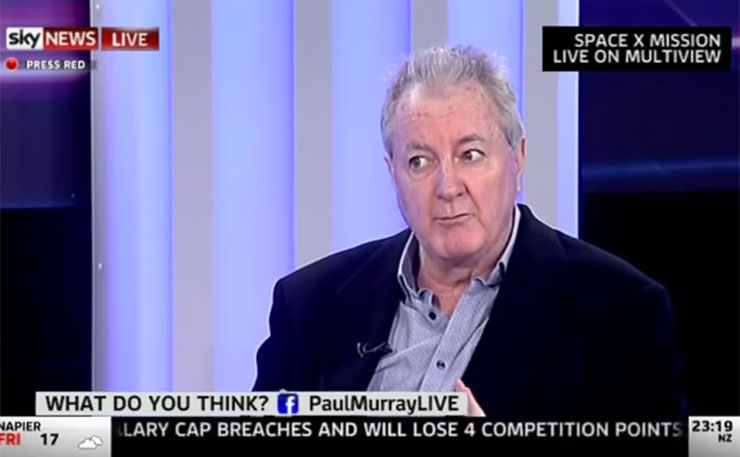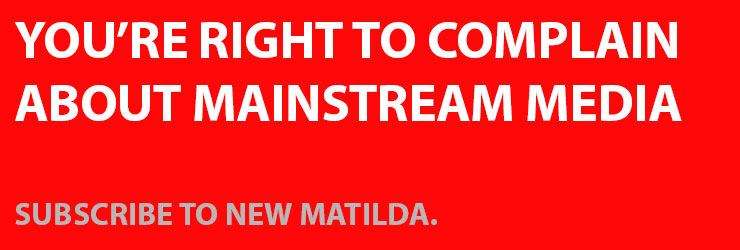ANALYSIS: Sheehan may be Fairfax’s worst writer, but he’s not the only bad one, writes Michael Brull.
Paul Sheehan has finally caused some controversy with his latest column. By now, everyone knows the cycle of outrage lasts a little while, and then passes. Many will expect this controversy to die down soon enough. However, as Islamophobia researcher Randa Abdel-Fattah pointed out, this is a “pervasive and systemic” problem. Here’s why.
1. It is not just a problem of Sheehan being lied to
According to Sheehan, the Police “responded promptly” to the allegations put forward in his original column. I have no doubt there would have been no controversy if he hadn’t offended the police in his article.
In his follow-up, the title (which is often written by editors) suggests the offence he has given to the police: “The story of Louise: why the police have no case to answer, but I do”.
The police don’t have a case to answer – but whether men from the Middle East do is another question. Sheehan goes on to say that, “I owed an apology to the NSW Police”. He doesn’t offer an apology to anyone else.
This is as close as Sheehan gets to commenting on what else he might have gotten wrong: “In the story recounted to me by Louise, she made insulting references to rapes committed by Middle Eastern men. I had wrongly amplified this insult by including her words in the column.”
There are a few points to make here. The insulting reference isn’t “to rapes committed”. The term he avoids re-using is “Middle Eastern Raping C*nts”. That is not an “insulting reference” to rapes. It is a racial slur, referring to Middle Eastern men. Not any Middle Eastern men – not, say, Ashkenazi Jews. Arab and Muslim Men.
I want to pause here. I still vividly recall being called a “little Jew c*nt” by a group of men I didn’t know when I was about 14. Think for a moment what it means that Sheehan chose to amplify this racial slur to Fairfax’s considerable readership. The Sydney Morning Herald has the second most popular online news website in Australia. This is how they used their reach and influence.
Let us suppose that Sheehan’s source hadn’t lied about the police. Let’s even assume she had told the truth about everything. To jump from one victim’s account to legitimising a racial slur – or in Sheehan’s account, amplifying it – is still appalling. Such a column could be written about Arabs or Muslims because of the already existing legitimisation of such bigotry in the most mainstream and respectable publications.
Suppose, for example, the story was about Jews. A young woman claimed she had been raped by a group of Jews. Can anyone imagine a columnist amplifying her claims about Jewish Raping C*nts? Can anyone imagine a prominent columnist legitimising a racial slur against Jews through the emotionally manipulative recounting of a horrific rape?
One only has to look at what happened with Mike Carlton after he criticised Israel to hazard a guess as to what would happen next. Racist and stereotypical reasoning may be acceptable in the case of Muslims and Arabs, but a publication like Fairfax would have no problem recognising why it’s not ok in relation to other communities.
The problem isn’t just Sheehan being lied to, because Sheehan wasn’t the only one impressed by the claims of “Louise”. Remember – the editors of SMH hyped the story on its front page. And they were presumably the ones who inserted the “correction”.
It observed that “many details” were not “corroborated” to the “satisfaction” of Fairfax. These include “untested aspersions against an ethnic group and untested allegations of inaction against the NSW Police”.
Apparently this needs to be said – untested aspersions against the NSW Police, and “an ethnic group” – are not even slightly the same thing.
One is bad reporting. The other is racial stereotyping. Aspersions against a minority group is another way of referring to the racial slur SMH and Sheehan amplified.
Tested aspersions against the police might be okay. The idea that aspersions against “an ethnic group” might be okay – that the only problem here is that they weren’t tested – is actually… well, let us say, the editors of SMH would not be the first to flirt with such ideas.
2. It is not just one Sheehan article
Paul Sheehan has a long history of casting untested aspersions. In 2008, he won the not-so-prestigious Wankley Award from Crikey. This was for when he warned that “thousands of Australian [sic]have paid a heavy price for the failed refugee-vetting processes in the 1970s and 1980s, when thousands of parasites who should never have been allowed into the country were approved.”
That’s right, Sheehan referred to refugees who came to Australia in the ‘70s and ‘80s as “parasites”. That article is still up – no apology – but they quietly removed Sheehan’s use of the term “parasites”.
Presumably, Sheehan was thinking above all of the Lebanese refugees who came during that period as the “parasites” who have harmed Australia. The fact that a paid columnist could refer to refugees as “parasites”, without it affecting his career or the reputation of his paper in the slightest tells you something about both.
Middle Eastern men have long seemed a particular pet cause of Sheehan. He has previously claimed that “most of the hatred, thuggery and racism at Cronulla in December, 2005, came from Muslims.”
Or there was the time he explained we should fear Muslims because there are a lot of them: “The Muslim world has about 1.5 billion adherents. If just one hundredth of one per cent interpret the Koran as a command to perform unforgiving jihad, then 150,000 people will engage in violent war. That is what we are seeing. One per cent of one per cent. It is a statistic we must not forget.”
Sometimes Sheehan can be more subtle. For example, there was this article he wrote about Keysar Trad. Sheehan explained that he was a “man carrying a legal bomb into courtroom 11A in the NSW Supreme Court building”. Because that’s the kind of thing Muslims love doing. Carrying bombs. What dog whistle?
Of course, Sheehan would argue that it’s impossible to consider this racist. After all, there’s no such thing as Islamophobia. “Yes, there is ample evidence that Australians have become uneasy about Muslims in general and hostile in specific cases, but this is about cause and effect.”
Sheehan went on to list a handful of anecdotes of misbehaviour and violence involving Muslims. He concluded that, “Given the abundant evidence of violent cause and fearful effect involving a small percentage of antagonists, the general charge of Islamophobia is an ideological fabrication.” So if there is anti-Muslim feeling, the cause is Muslim behaviour. The former is apparently justified – so justified that it is inappropriate to refer to it as a phobia.
3. It is not just Sheehan at Fairfax
Whilst Sheehan has engaged in relatively overt “aspersions”, he is not the only one at Fairfax doing so. For example, their national security correspondent shared the wisdom of one Australian soldier on Iraqis: “The harsh reality is that the value of life is seen very differently.” This kind of thing isn’t even noticed.
Or there’s the time when Tony Abbott wrote about what he considers the “massive problem within Islam”. An SMH editorial responded by conceding that Abbott “made telling points when he said ‘Islam needs to delegitimise the urge to behead all those who insult the Prophet – but only Muslims can do this. He was right on other points, too.” However, “we do not support… the tone and timing of Mr Abbott’s contribution”.
Or there was the case of when Waleed Aly wrote an article criticising Abbott’s claims about Islam. Fairfax gave space to Paul Monk to respond to Aly. Naturally, he wasted no time in casting aspersions.
“If Aly and his co-religionists are keen to have such a conversation, no obstacle stands in their way. But if, whatever their take on the Islamic past, they have a vision of Islam becoming the religion of the world at large and of some form of sharia law becoming ascendant over secular civil law; or if they remain ambivalent about the barbarities of their ‘reformers’, then we all have a serious problem.”
Note how the debate has moved from the issues, to specifically “Aly and his co-religionists”, who Monk now seems to make him accountable for. And now, Aly and his co-religionists are suspicious. It is not clear if they want Islam to rule the world, if they want to abolish secular civil law, or if they will “remain” ambivalent about “barbarities”.
Fairfax’s chief political correspondent also thought that, “Viewed objectively”, Abbott proposed some “reasonable” changes to Islam. Similarly, star columnist Annabel Crabb thought it was “pretty hard to disagree” with the proposition that “Islam need[s]to have a good hard look at itself; ideally by means of a formal Reformation process”.
One can go on at length. Fairfax has given space to others who think there is something fundamentally wrong with Islam, who think that it is “in desperate need of internal reforms”, a problem which is “at the core” of the radicalisation process leading to jihadi terrorism.
It has also given repeated favourable coverage to Ayaan Hirsi Ali. Before her current position, advocating the “reform” of Islam, Ali favoured crushing Islam “in all forms”, including “militarily”. Otherwise, we will “have to live with the consequences of being crushed”.
Can anyone imagine sympathetic interviews being given to someone making similar claims about Jews and Judaism?
Or then there’s the case of Rachel Olding, whose reporting is generally hard to distinguish in quality from that of Sheehan.
The problem is not just Sheehan. There is strong reason to suspect that there are others at higher levels at Fairfax who are broadly sympathetic to his worldview, which is why he has thrived at the paper for so long whilst writing in the way he does, and why there is so much similar content at Fairfax.
4. It is not just Fairfax
At first, I thought of writing about the many other examples of “aspersions” by media outlets and personalities, like Alan Jones referring to Lebanese men as “vermin”.
Yet there is another element that deserves comment. The problem is not just Fairfax. Many of the examples picked out above passed with zero controversy.
Everyone in Australia is at least vaguely aware of the regular outraged reaction to various things that happen in public and political life here. Yet the “untested aspersions” routinely cast about a particular “ethnic group” almost never qualify for this type of outrage.
In this case, Sheehan was forced into a correction and apology, but it is unlikely that would have happened if he hadn’t offended the police.
If his “aspersions” against the police had been tested, his column probably would have passed with as little reaction as the others.
That outrage has come now doesn’t explain why so many other aspersions have passed unnoticed for so long.
Donate To New Matilda
New Matilda is a small, independent media outlet. We survive through reader contributions, and never losing a lawsuit. If you got something from this article, giving something back helps us to continue speaking truth to power. Every little bit counts.





